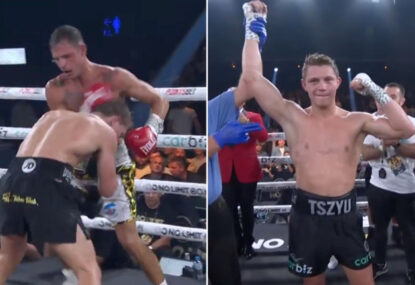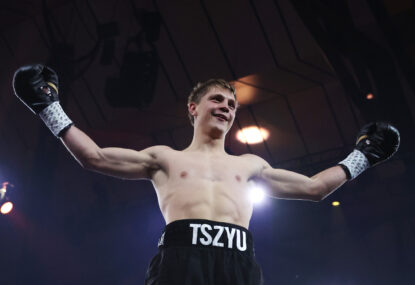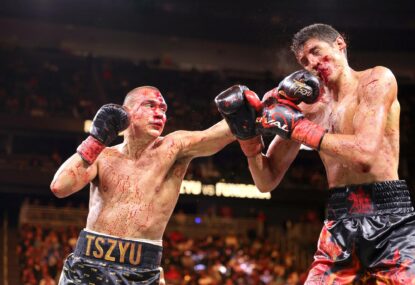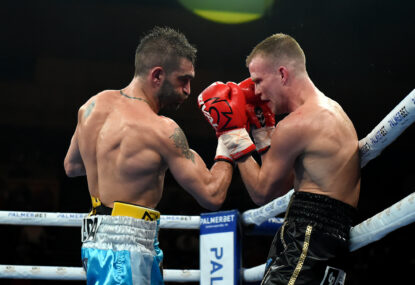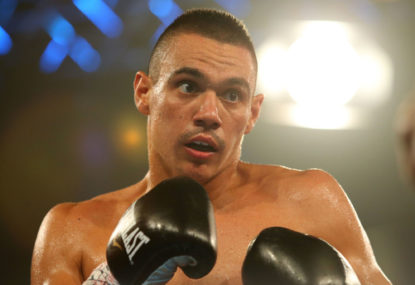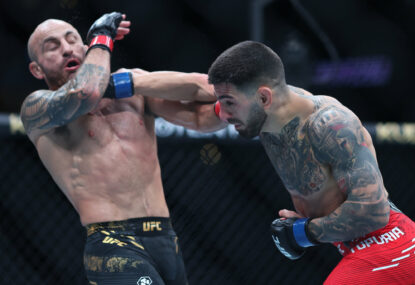While the focus of the boxing world this weekend is on the Manny Pacquiao-Shane Mosley fight in Vegas, another fight has a lot more riding on it for Australian boxing fans. Australian Daniel Geale challenges IBF middleweight champion Sebastian Sylvester in Germany.
The location of the bout has left fans of Geale pessimistic as boxers from Australia in the middleweight and super middleweight divisions have a bad history when challenging for world titles in Germany.
Five of our better fighters in the last ten years have headed to Germany to challenge for a recognised world title, and all have returned home empty handed.
Many have bought into the theory that when challenging for a title in Germany, a knockout is needed to bring the belt home.
Yet, out of the six title fights between Australians and Germans on German soil in recent time, only one fight was controversial.
The first two of these fights took place within four months of each other against the same opponent. First Anthony Mundine, then Ricky Thornberry challenged IBF super middleweight champion Sven Ottke in 2001 and 2002 respectively.
Ottke’s record on paper is incredible.
The three time Olympian was one of the few boxers in history to retire with no blemishes to his professional record And he defended his IBF super middleweight title 21 times, yet few regard Ottke as an all-time great.
Ottke was widely known to be on the receiving end of numerous controversial decisions. Sven Ottke was probably the fighter who started the myth that you have to knock a German world champion out in order to take a title from him on German soil.
These two fights, however, were exceptions to the Ottke rule.
Mundine built up an early lead on the cards but the experience factor between the two men (Ottke had roughly 300 amateur fights and Mundine had next to no amateur career) was a huge factor in this fight.
Ottke saw how much energy Mundine was exerting in racking up the early lead and he let him use it, knowing he could finish the 12 round fight stronger. Ottke was often regarded as a light puncher based off his 6 knockout victories in 34 professional wins, which wasn’t true.
While Ottke wasn’t a super middleweight George Foreman by any stretch of the imagination. It was more of a lack of killer instinct and the fact that he spent so long fighting as an amateur that he never fully adjusted his game to the professional rules rather then a lack of punching power that led to his few knockout victories.
Ottke rattled the tiring Mundine in the 9th round and put him out for the count in the 10th with a short right hook.
No controversy there and Thornberry couldn’t claim he was robbed either. Ottke convincingly won their fight on points and while he may have done better than the judge’s scorecards suggested (all three judges awarded every round to Ottke), the decision was never disputed.
Next to head to Germany was Danny Green as he faced Markus Beyer for the WBC super middleweight title.
Green was an unknown on the world scene, having racked up a 16-0 record with all 16 wins inside the distance fighting mainly in Australia and Beyer’s people brought him in thinking his inexperience would be something they could capitalise on while still having a platform to market the challenger on in Green’s power.
The Australian showed that power early, stunning Beyer with two knockdowns in the opening two rounds and opening a gash above Beyer’s right eye.
Green controlled the pace and won the third and fourth rounds and was up by a wide margin going into the fifth round.
In round five, the two clashed heads.
It wasn’t fully intentional but it was Greens fault. He moved his head into Beyer’s and the doctor was called to check the cut. The head butt, in my opinion anyway, did no further damage to the cut. The cut was bad enough to stop the fight and it should have gone to the scorecards.
And originally the referee said it would go to the cards.
However, after a conversation involving Beyer’s promoter among others ringside and the referee, the headbutt was no longer ruled unintentional and Green was disqualified.
Green bounced back, winning the interim title against Canadian Eric Lucas, another fighter who was on the wrong end of a decision against Markus Beyer in Germany. And some 18 months later the two met in a rematch.
Beyer this time was better prepared for Green, countering his punches with body shots that sapped the energy out of Green.
Despite scoring a knockdown in the final round, Green fell short on the judge’s scorecards. The fight was close, but the right man won the decision.
Green was still raw and unpolished and this was a learning curve for him.
Former Shane Mosley victim Shannan Taylor headed to Germany in 2006 in what was an optional defence for the then underrated IBF champion Arthur Abraham, and while he became only the third man at that stage to last 12 rounds with Abraham, he was outclassed and lost every round on the cards.
Most recently, 2004 Australian Olympic boxing team captain Jamie Pittman headed to Germany in 2008 to take on Felix Sturm, a man most famous for giving Oscar De La Hoya all he could handle in a 2004 bout.
Pittman was taking a major step up in class, and despite fighting well early on, Sturm wore him down with body shots and stopped him in seven.
While Germany isn’t the fairest place to have a world title fight, the myth is just that.
It’s no more corrupt then Las Vegas, where we’ve seen ridiculous decisions like the first Lennox Lewis vs Evander Holyfield fight, where Lewis battered Holyfield in at least ten of the twelve rounds, only for the fight to be ruled a draw. Or a better example for Australians is the first Jeff Fenech vs Azumah Nelson fight, where Fenech had Nelson with his back to the ropes for the majority of the fight while Fenech worked him over, only to have his fight ruled a draw also.
Even Australia has shown some bad officiating in recent fights.
You only have to go back as far as the Mundine vs Garth Wood rematch to see how bad a night a referee can have in a big fight in Australia.
The other thing to factor into this fight is that Geale is better then Mundine was when he fought Ottke and had more experience than when Green fought Beyer in Germany.
Geale was a Commonwealth Games gold medallist in 2002.
He had an extensive amateur background and, unlike Pittman at that time, he’s been tested as a professional against world class opponents. In his last fight, he took on Roman Karmazin, a man who was once considered the best junior middleweight in the world, and he dominated him.
Sebastian Sylvester isn’t as good as Sven Ottke, Arthur Abraham, or in my opinion, even as good as Markus Beyer.
Sylvester is one of many guys in boxing calling himself a world champion who benefits from the fact that there is one world title per 60-70 professional boxers in the world!
He lost his initial title challenge against Felix Sturm by knockout, only to get a second shot in his following fight after Abraham vacated his title to compete in the super six.
I’m fully of the belief that if Daniel Geale scores a convincing win over 12 rounds, he will get the decision and the title.
Fans need to take a deep breath, forget the fact that this fight is in Germany, and enjoy a rare thing for Australian boxing; one of our own is fighting with a genuine chance of bringing home a legitimate world title.
Daniel Geale vs Sylvester from Germany live 6am AEST on Main Event






























































































